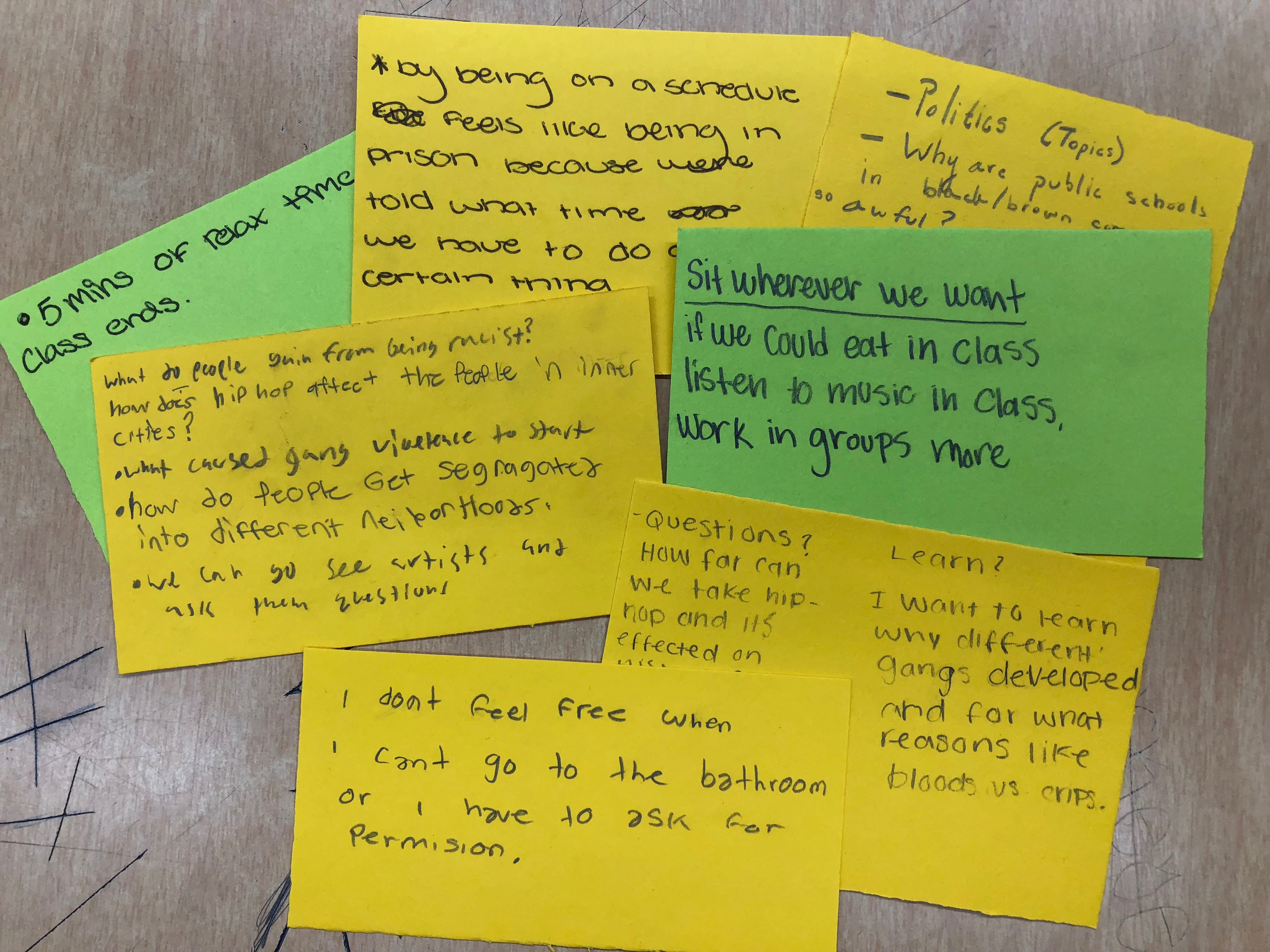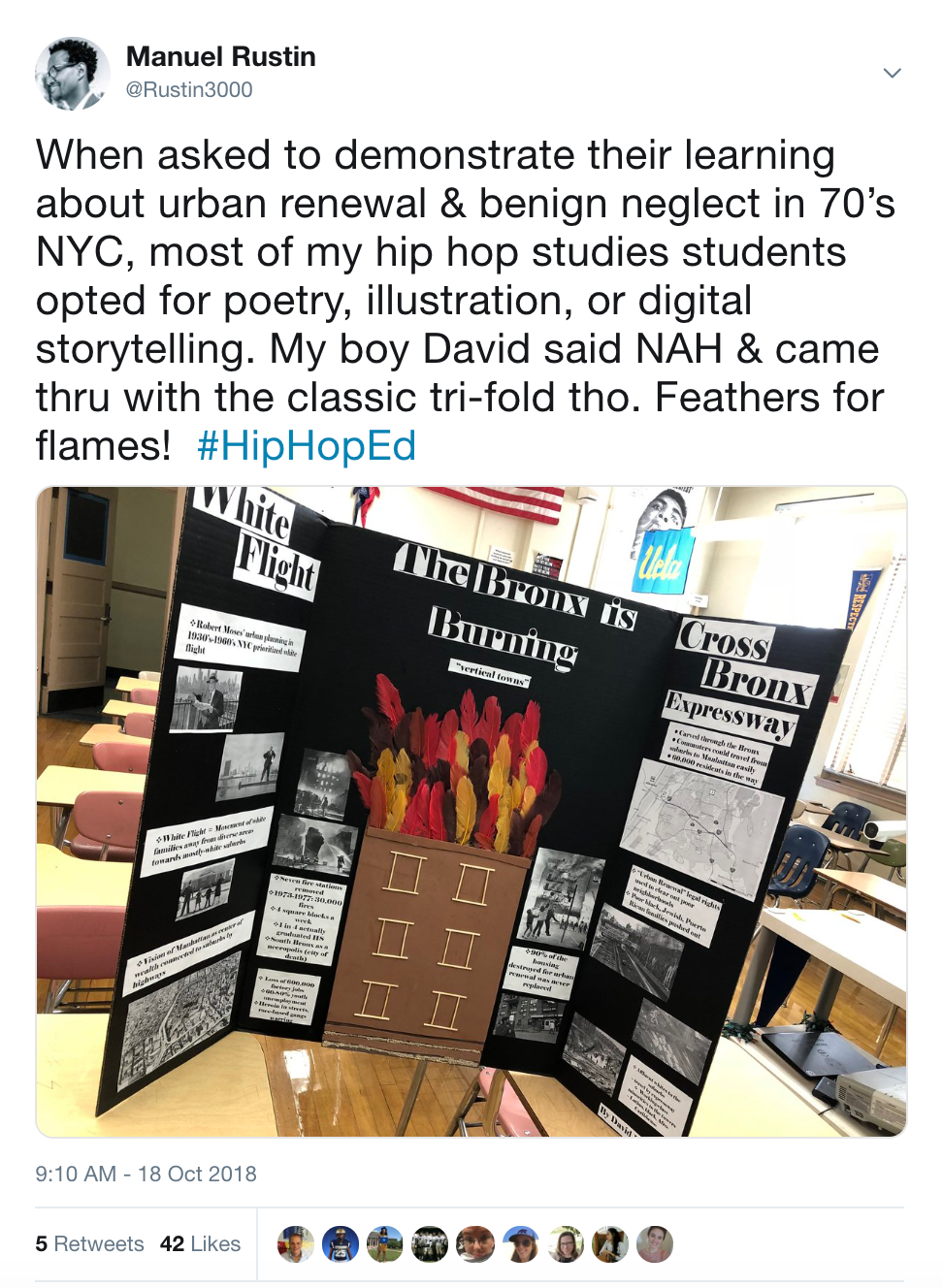School Leadership 2.0
A Network Connecting School Leaders From Around The Globe
Teachers, It’s Not All About You - Learning to Relinquish Power in My Classroom
Teachers, It’s Not All About You
Learning to Relinquish Power in My Classroom
ROSE: When your daddy walked through the house he was so big he filled it up. That was my first mistake. Not to make him leave some room for me.
Iwas trained to command and control the classroom — to be so structured, regimented, and big that no student would dare get unruly or challenge my power. My first year teaching high school I was effectively the character Troy from August Wilson’s Fences (if you’re familiar with that play, you know this isn’t a good thing). Perhaps the most important lesson I’ve learned since entering the teaching profession fifteen years ago was that it’s not all about me — the power within my classroom shouldn’t be wielded in the name of reinforcing oppressive structures that make students hate school.
Rose’s reflection at the conclusion of Fences — that Troy was so big that he filled up the house and left no room for her — is a lesson that many teachers could benefit from learning. Teachers fill up their classrooms with draconian command and control policies, ceaseless teacher-talk, regimented curriculum, test-centered unit plans, and a widespread absence of any student input into in the teaching and learning that is supposed to take place on a daily basis. Teachers are, in effect, the curators of oppression in America’s classrooms.
I’ve had to learn over the years to relinquish my grip on classroom power and make space for students. The irony here is that I entered the profession to liberate, and when I was applying to teacher education programs as an undergraduate I used the term “empower” in my personal statements nearly a dozen times. I wrote that I wanted to become a teacher so that I could “empower” students, yet all I did in my first few years was monopolize all the power and run my class as Mr. Totalitarian. One cannot liberate through oppressive practices — that’s not how freedom works.
Looking back, the disconnect between wanting to empower my students and actively silencing them was largely rooted in the overlooked but common deficit-oriented view that students lack power and initiative and they therefore need a passionate teacher to gift it to them. Teachers think that they are the epicenter of a successful classroom and that absolute power should be wielded by them because they know what’s best for students. A lot of us teachers need to get over ourselves.
Deficit views of students often show themselves in the “give my students a voice” sentiment that’s commonly heard from teachers. To presume that students somehow lack voice is often rooted in deficit notions of them lacking power and initiative. Students most certainly have voice and power and this is often evidenced by the fact that a single student can halt any lesson in its tracks if they wanted to. For generations schools have framed this as “willful defiance,” and the smartphone age has blessed us with some terrific videos of students flexing their power and initiative no matter the consequences.
The young minds in our classrooms have plenty of voice and power — schools just don’t often recognize it or assist students in applying it to their own learning. Learning to welcome and utilize students’ power has been a cornerstone of my growth as a teacher. Whereas I initially received all the compliments and applause from administrators for my ability to “control” my classroom, I’ve learned to let go of the wheel bit by bit over the years. I’ve stopped the routine micro-flexing of my power — no longer do I force students to only write in pen, no longer do I refuse to give students basic supplies when they show up without the needed materials, and no longer do I deliver whole-class punishments for minor isolated infractions.
Those smaller demonstrations of my power were one thing, but the bigger, more space-consuming flexing of power came from my syllabus and my coursework. My old syllabus had so many bold “No’s” and threatening “you will fail this class if you don’t comply” messages that it practically wore mirror aviators and banged a baton against prison bars as students read it. No late work! No extra credit! Tardy? Wrath. No book? More wrath!
How did I go from studying Freire as a student to being Officer Rustin as a teacher? Aside from the unexplored deficit-thinking that I held towards students, I was also afraid. Afraid that students couldn’t handle freedom. Afraid that I’d get played. Afraid that my room would be chaos. Additionally, I gravitated towards the Black-male-teacher-as-disciplinarian role that too many Black male educators are pushed towards. Schools love a strong Black man who can put “those” unruly kids in check. But a Black male teacher who thinks freely and educates to liberate? Not so much. Needless to say, Black male teachers are not monolithic group. Sure, some of us want to act like Major Payne in order to please the higher-ups and receive applause for being no-nonsense. But that’s not for me; I had to check myself before going down that road.

I’ve grown out of being so big. In the process, I’ve come to learn that those faux high-expectations I had in my syllabus and my daily practice were both useless and silly. I now present my new syllabus as a proposal rather than a demand. Some years back I started having students create a counter-syllabus, or a syllabus created by the class that I would have to abide by. This year we co-constructed a common syllabus and classroom policies. Students’ biggest ask? Let them use the restroom freely and eat snacks during class. Both are still hard No’s for teachers who refuse to relinquish power, but it turns out that I can both allow students these freedoms and succeed at facilitating a quality learning environment at the same time. Wild.
I’m learning to relinquish my control over the daily lessons and activities we have in our class as well. Years ago I created a Hip Hop Studies course as a study of modern America that centers students’ own lived experiences and perspectives. In it, students lesson-plan and teach half of the course while I sit in the back and observe. Students work together to determine what topics they wish to explore and they lead lessons through the study of music that they select. I’ve learned that I don’t need to be the expert all the time — students’ community cultural wealth needs to be given space to create the powerful learning that we all dreamed about when we entered the profession.
In my American Government class we’re learning about democratic processes and civic engagement by conducting Youth Participatory Action Research. Students chose the class topic — sexual violence in our community — and they are working in research teams to gather and analyze data on this problem and develop action plans to address it. No more Rustin-driven content lectures and banking-model education. I’m not Mr. Totalitarian anymore, I’m just a facilitator.

Relinquishing my power also means being open to allowing students to demonstrate their learning in their own ways. We recently studied the impact of urban renewal and benign neglect policies on communities of color. Old Rustin would have mandated that students write an essay on this topic. So. Many. Essays. New Rustin is open to other options. One student created a tri-fold poster on the topic. There’s no way that I would have accepted this in the past, but why did it matter if he chose an old-school tri-fold or some other medium as long as I could see that he grasped the content? This is his one and only run at being a student in this class — he should have some say in how that experience takes shape.
And for those wondering…Yes, my students still write plenty of essays. Relinquishing one’s grip on power neither requires a lowering of academic expectations nor a total abandonment of traditional coursework. It merely requires allowing students more choice, more input, and most importantly, more space.
Teacher — it’s not all about you. Leave some room for your students.
JOIN SL 2.0
SUBSCRIBE TO
SCHOOL LEADERSHIP 2.0
Feedspot named School Leadership 2.0 one of the "Top 25 Educational Leadership Blogs"
"School Leadership 2.0 is the premier virtual learning community for school leaders from around the globe."
---------------------------
Our community is a subscription-based paid service ($19.95/year or only $1.99 per month for a trial membership) that will provide school leaders with outstanding resources. Learn more about membership to this service by clicking one of our links below.
Click HERE to subscribe as an individual.
Click HERE to learn about group membership (i.e., association, leadership teams)
__________________
CREATE AN EMPLOYER PROFILE AND GET JOB ALERTS AT
SCHOOLLEADERSHIPJOBS.COM
New Partnership
Mentors.net - a Professional Development Resource
Mentors.net was founded in 1995 as a professional development resource for school administrators leading new teacher induction programs. It soon evolved into a destination where both new and student teachers could reflect on their teaching experiences. Now, nearly thirty years later, Mentors.net has taken on a new direction—serving as a platform for beginning teachers, preservice educators, and
other professionals to share their insights and experiences from the early years of teaching, with a focus on integrating artificial intelligence. We invite you to contribute by sharing your experiences in the form of a journal article, story, reflection, or timely tips, especially on how you incorporate AI into your teaching
practice. Submissions may range from a 500-word personal reflection to a 2,000-word article with formal citations.
You need to be a member of School Leadership 2.0 to add comments!
Join School Leadership 2.0